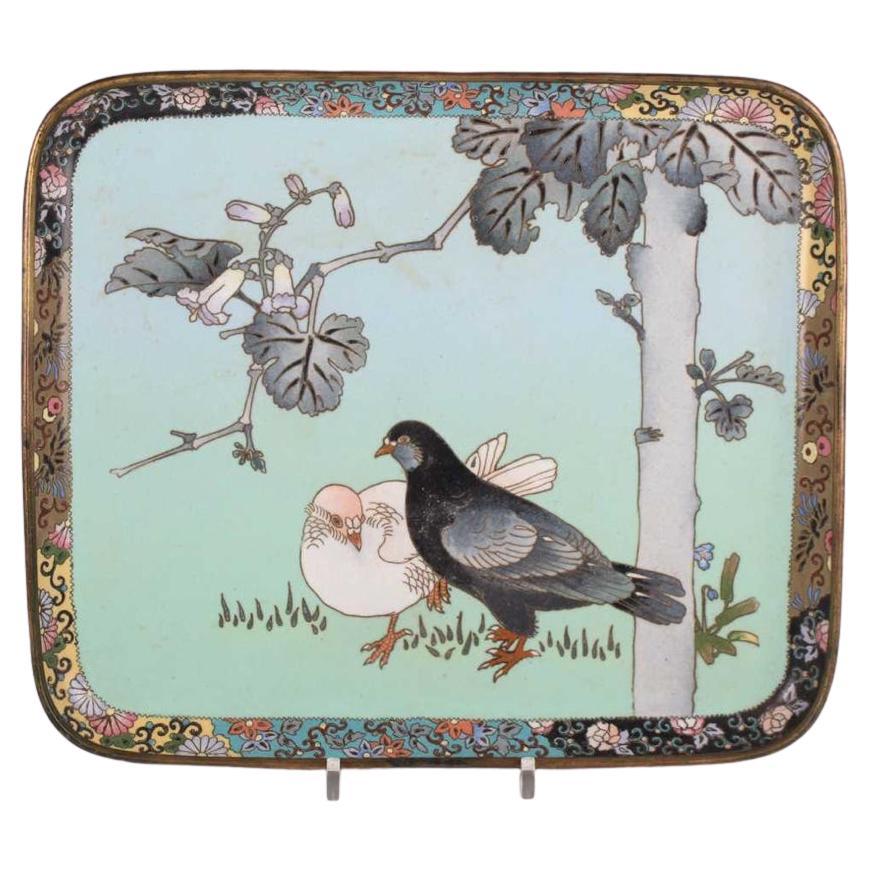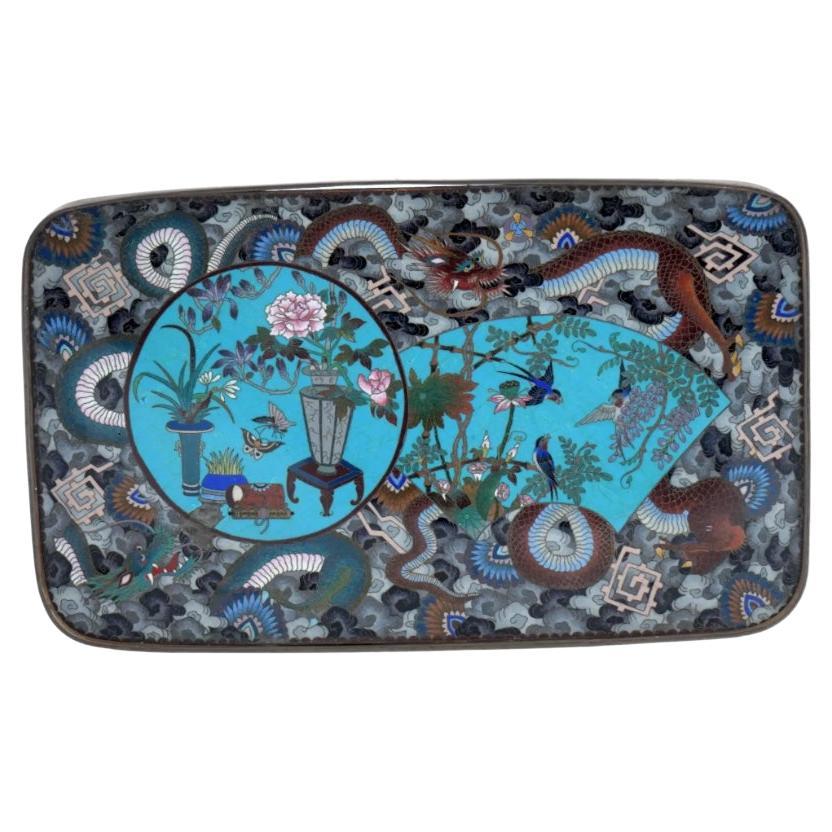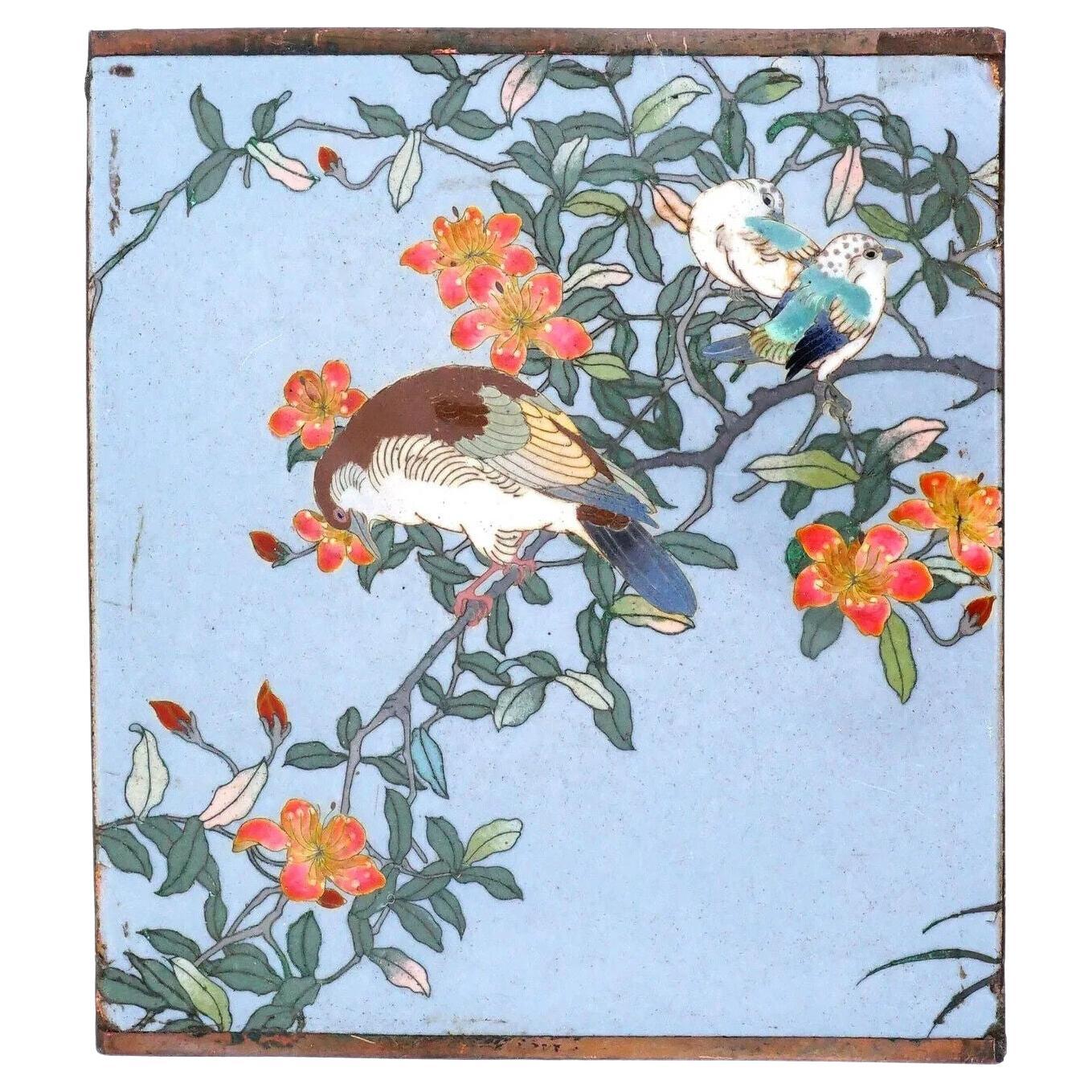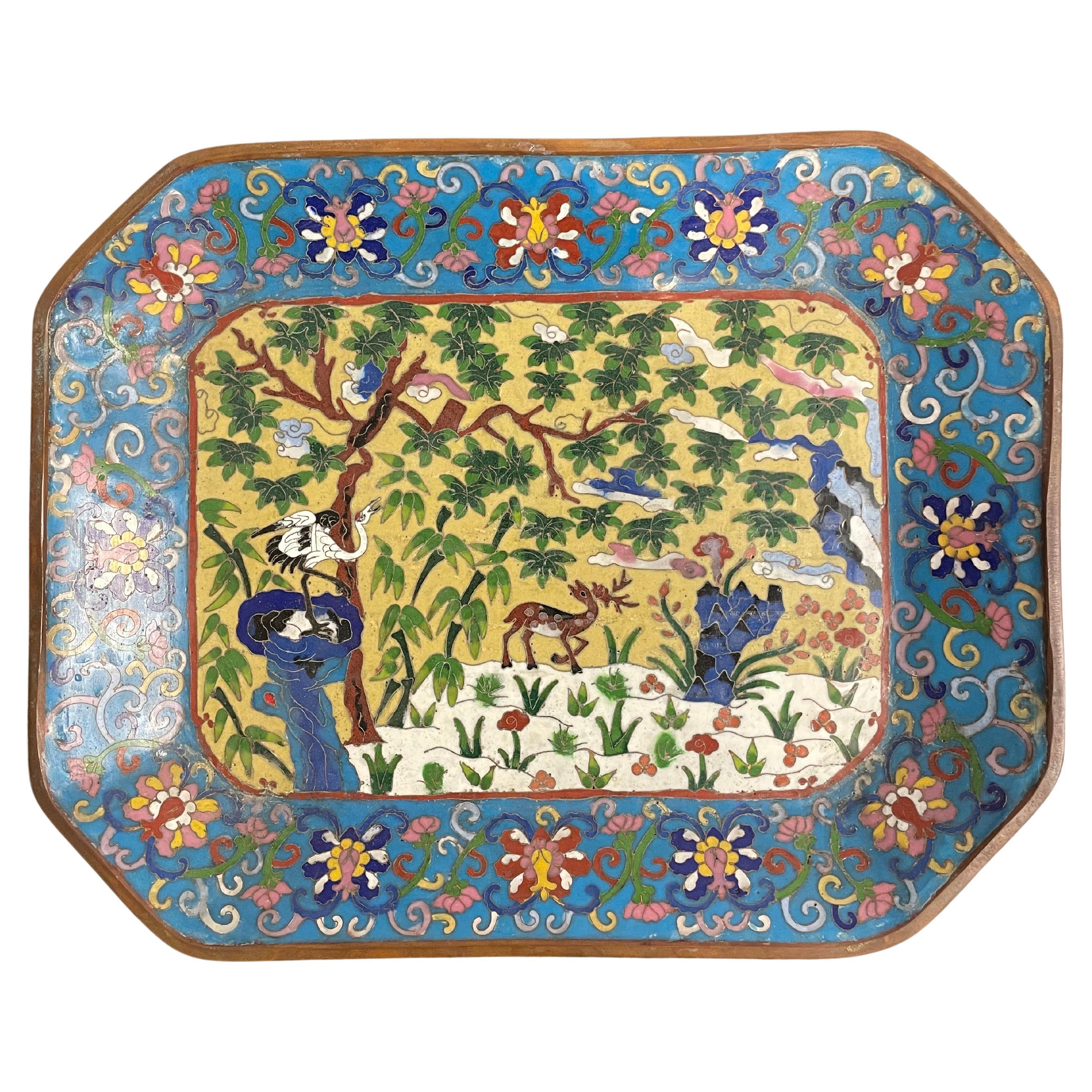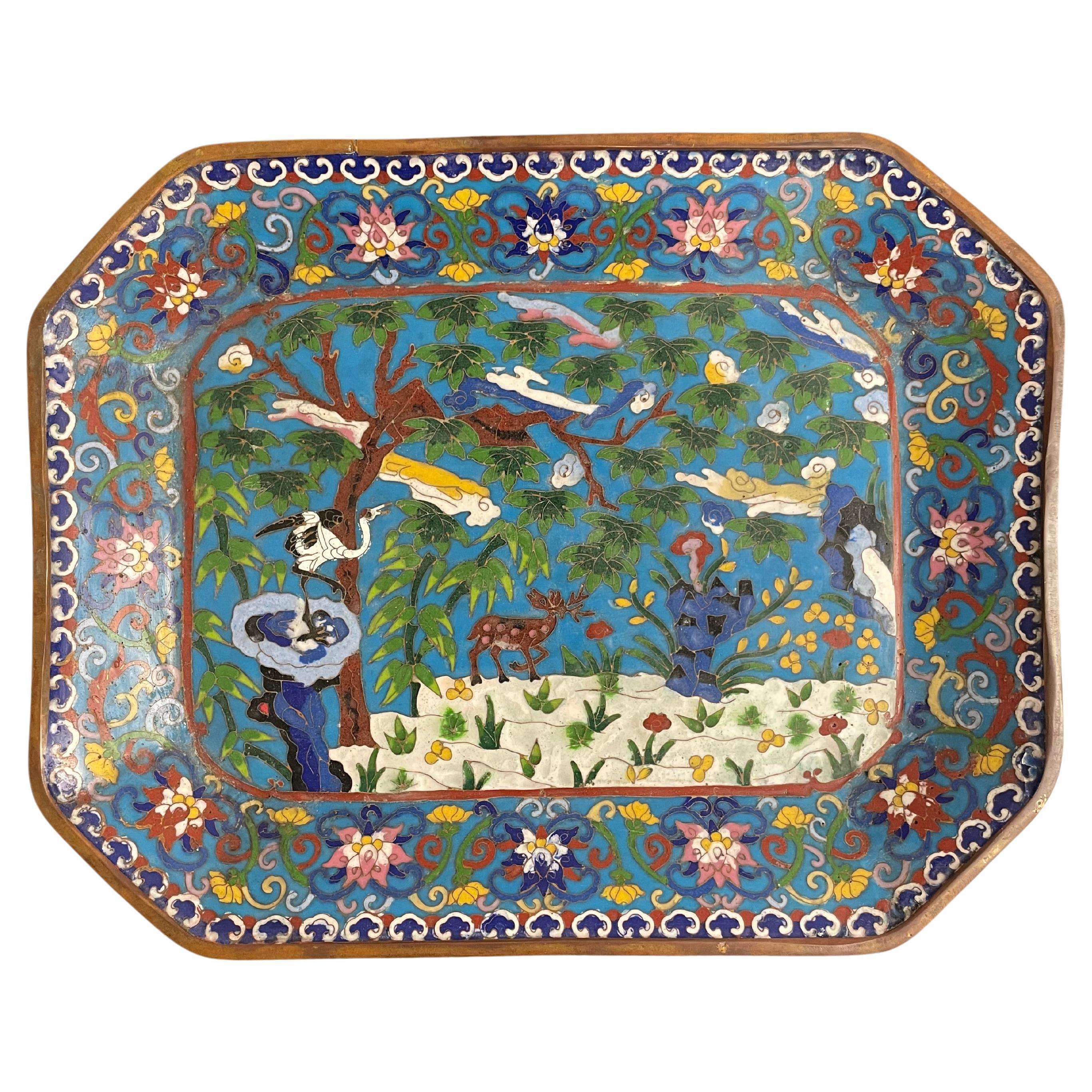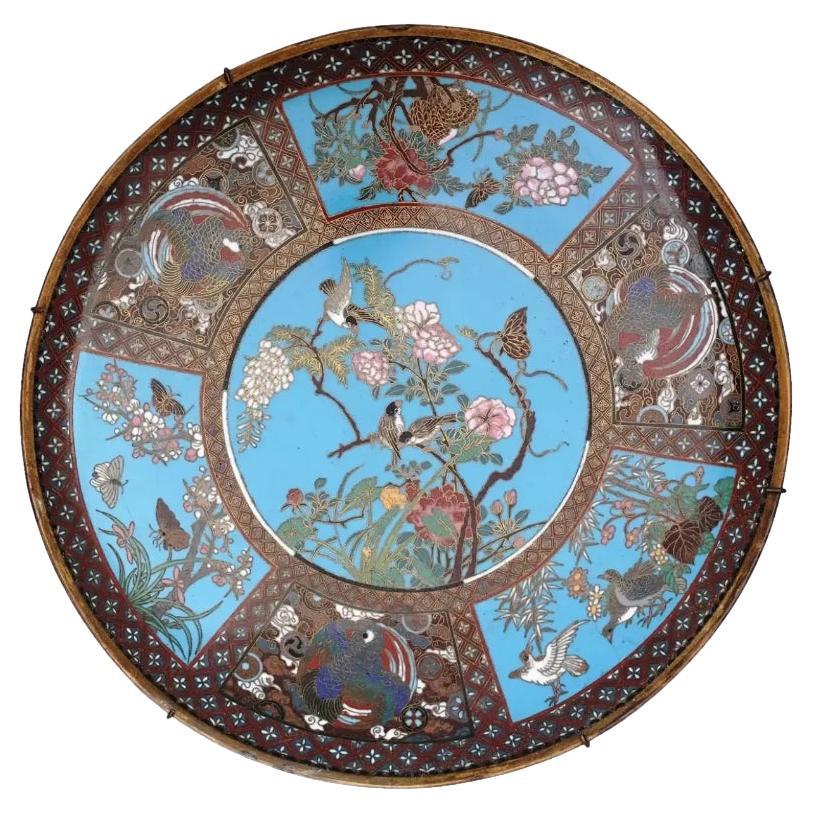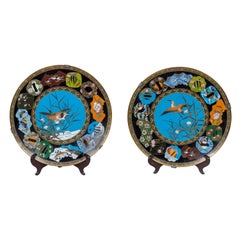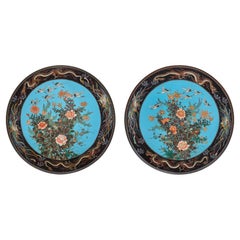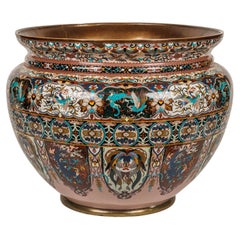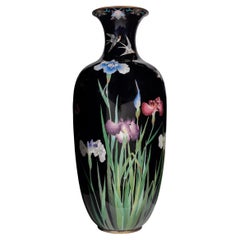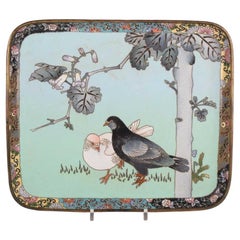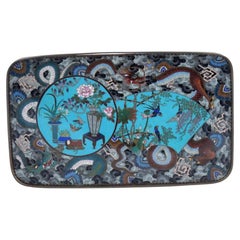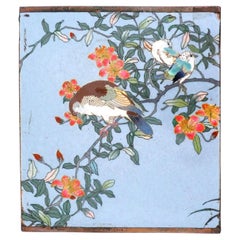Items Similar to A Grand Meiji Cloisonné Enamel Tray Featuring Cherry Blossoms and Birds
Want more images or videos?
Request additional images or videos from the seller
1 of 12
A Grand Meiji Cloisonné Enamel Tray Featuring Cherry Blossoms and Birds
$55,000
£42,497.04
€49,130.58
CA$77,718.98
A$87,167
CHF 45,648.01
MX$1,059,164.07
NOK 579,653.25
SEK 549,552.12
DKK 366,734.12
About the Item
A Grand Meiji Japanese Cloisonné Enamel Tray – Lush Cherry Blossom Garden with Sparrows, Quail, and Japanese Fountain, Circa 1890
This monumental exhibition-size Meiji period Japanese cloisonné enamel tray, dating to circa 1890, is a breathtaking masterpiece that showcases the refined artistry and technical brilliance of the era. Set against a captivating turquoise ground, the tray serves as the perfect backdrop for a lush cherry blossom garden, beautifully depicted in full bloom with delicate white blossoms.
At the heart of this stunning composition, 17 sparrows and 5 quail are shown in graceful flight, weaving through the pristine white cherry blossoms. The scene captures a harmonious moment in nature, where these birds interact with the flora in a dynamic display of life and vitality. A serene Japanese fountain is elegantly integrated into the garden scene, enhancing the tranquil atmosphere and symbolizing the connection between nature and culture in traditional Japanese art.
The sparrow, in Japanese art, symbolizes happiness, freedom, and good fortune, often associated with spring and the renewal of life. The quail, revered for its gentle nature, represents peace, humility, and a deep connection to nature. Both birds in this scene evoke harmonious, tranquil imagery, reinforcing the themes of renewal and balance in Japanese culture.
The cherry blossoms, or sakura, are more than just a beautiful motif; they are deeply significant in Japanese culture and art, representing the fleeting nature of life. These blossoms are a poignant reminder of the transient beauty of existence, blooming briefly before they fall, symbolizing the impermanence of life. Their inclusion in this tray underscores the reverence for the ephemeral nature of beauty and renewal.
The tray’s intricate border features ornate scrollwork that amplifies the cultural themes, with depictions of Mount Fuji, a powerful dragon over water, and the Seven Lucky Charms, which embody prosperity, protection, and good fortune. The dragon, a symbol of strength, power, and wisdom, is often associated with good fortune and protection in Japanese folklore. Traditional Japanese screen designs add further depth, while a delicate wood-patterned gold wire border brings the composition together with an added touch of elegance.
Measuring 27" in length and 16" in width, this tray is not just a functional object but a monumental work of art. Its extraordinary size and intricate detailing make it an exceptional piece for any discerning collector or as a striking centerpiece in an exhibition.
Given its grand scale and meticulous craftsmanship, pieces of this nature would only have been created for the most prestigious World Fairs and International Expositions held during the late 19th century. Japan, eager to showcase its cultural and industrial advancements to the world, used these events as a platform to display their finest works. This tray, with its vibrant design and monumental size, would have been reserved for such an exhibition, serving as a symbol of Japan's mastery in the art of cloisonné enamel. The tray’s creation was undoubtedly meant to impress international audiences, emphasizing Japan’s rise as a cultural and artistic powerhouse.
With very good condition and ready to display, this tray exemplifies the height of Meiji-period craftsmanship and is truly a museum-quality treasure.
27" length x 16" width
Very good condition. Ready to place.
Exhibition quality and size -a truly exceptional and museum example.
- Dimensions:Height: 27 in (68.58 cm)Width: 16 in (40.64 cm)Depth: 1 in (2.54 cm)
- Style:Meiji (Of the Period)
- Materials and Techniques:
- Place of Origin:
- Period:
- Date of Manufacture:C. 1890
- Condition:Wear consistent with age and use.
- Seller Location:Queens, NY
- Reference Number:1stDibs: LU1798241335852
About the Seller
5.0
Vetted Professional Seller
Every seller passes strict standards for authenticity and reliability
Established in 1980
1stDibs seller since 2016
63 sales on 1stDibs
Typical response time: 6 hours
- ShippingRetrieving quote...Shipping from: Queens, NY
- Return Policy
Authenticity Guarantee
In the unlikely event there’s an issue with an item’s authenticity, contact us within 1 year for a full refund. DetailsMoney-Back Guarantee
If your item is not as described, is damaged in transit, or does not arrive, contact us within 7 days for a full refund. Details24-Hour Cancellation
You have a 24-hour grace period in which to reconsider your purchase, with no questions asked.Vetted Professional Sellers
Our world-class sellers must adhere to strict standards for service and quality, maintaining the integrity of our listings.Price-Match Guarantee
If you find that a seller listed the same item for a lower price elsewhere, we’ll match it.Trusted Global Delivery
Our best-in-class carrier network provides specialized shipping options worldwide, including custom delivery.More From This Seller
View AllAn Exquisite Large Pair of Meiji Period Cloisonné Enamel Plates with Tsubas
Located in Queens, NY
An Exquisite and Large Pair of Meiji Period Japanese Cloisonné Enamel Plates with Tsuba Fittings and Nature Scenes, circa 1885
This exquisite pair of large Meiji period Japanese clo...
Category
Antique 19th Century Japanese Meiji Metalwork
Materials
Enamel
Massive Museum Pair of Meiji Period Japanese Cloisonne Enamel Chargers Plates
Located in Queens, NY
A massive Museum pair of Meiji Period Japanese Cloisonne Enamel chargers plates, attributed to Hayashi Kodenji Studio, 19th century.
Each measuring ...
Category
Antique 19th Century Japanese Meiji Decorative Art
Materials
Enamel
Monumental Meiji Period Japanese Cloisonne Enamel Jardiniere
Located in Queens, NY
A Monumental Meiji Period Japanese Cloisonne Enamel Jardiniere.
This monumental Meiji Period Japanese cloisonne enamel jardiniere is...
Category
Antique 19th Century Japanese Meiji Planters, Cachepots and Jardinières
Materials
Enamel, Copper
Palace-Sized Japanese Cloisonne Enamel Vase Adorned with Irises and Sparrows
Located in Queens, NY
Introducing a truly magnificent Palace-Sized Japanese Cloisonné Enamel Vase adorned with exquisite irises and graceful sparrows. This extraordinary vase showcases the epitome of Japa...
Category
Antique 19th Century Japanese Meiji Vases
Materials
Enamel
Majestic Japanese Cloisonne Enamel Covered Jar with Dragons, Theater Characters
Located in Queens, NY
A Majestic and Large Japanese Meiji Cloisonné Enamel Covered Jar with Dragons, Mythological Creatures, and Theater Characters.
Presentin...
Category
Antique 19th Century Japanese Meiji Vases
Materials
Enamel
Large Pair of Meiji Period Japanese Cloisonne Enamel Vases Attributed to Goto
Located in Queens, NY
A large pair of Meiji Period Japanese cloisonne enamel vases attributed to Goto Seizaburo, 19th century.
These vases were made during the Meiji period (1868-1912) in Japan and are characterized by their blue enamel background with intricate designs of flowers, birds (including pigeons), butterflies and landscapes.
The use of blue enamel as a background creates a striking contrast with the colorful designs, making these vases particularly visually appealing which are appreciated for their beauty, craftsmanship, and cultural significance.
Goto Seizaburo (1852-1914) was a renowned Japanese cloisonne enamel artist...
Category
Antique 19th Century Japanese Meiji Metalwork
Materials
Copper, Enamel
$20,000 Sale Price
20% Off
You May Also Like
A Fine Japanese Meiji Period Cloisonné Enamel Tray Attributed to Namikawa Sösuke
Located in London, GB
A Japanese Meiji Period Cloisonné Enamel
Tray Attributed to Namikawa Sösuke, Late 19th Century
A refined rectangular cloisonné enamel tray with softly rounded corners and shallow...
Category
Antique 19th Century Japanese Metalwork
Materials
Enamel
Exquisite Antique Meiji Japanese Cloisonne Tray Featuring Dragons in Clouds, Att
Located in Long Island City, NY
An antique Japanese, late Meiji era, enamel over copper tray. The interior of the ware is adorned with a polychrome enamel design representing figural medallions depicting plants in ...
Category
Antique Late 19th Century Japanese Meiji Metalwork
Materials
Enamel, Copper
Japanese Cloisonne Enamel Plaque Depicting Birds And Flowers
Located in Long Island City, NY
A Japanese enamel on metal plaque. The plaque represents birds seated on sakura tree branches made in the Cloisonne technique. Unsigned. Antique and Vintage Asian and Oriental Enamel...
Category
Antique Late 19th Century Japanese Meiji Metalwork
Materials
Enamel, Metal
A Chinese Cloisonne Tray with Qianlong Mark, Early 20th Century
Located in ARMADALE, VIC
A Chinese Cloisonne Tray with Qianlong Mark, Early 20th Century
Home decor, Interior design and collectibles.
Provenance: Private Victoria Collection.
...
Category
Early 20th Century Chinese Metalwork
Materials
Bronze
$460 Sale Price
50% Off
A Chinese Cloisonne Tray with Qianlong Mark, Early 20th Century
Located in ARMADALE, VIC
A Chinese Cloisonne Tray with Qianlong Mark, Early 20th Century
Home decor, Interior design and collectibles.
Provenance: Private Victoria Collection.
...
Category
Early 20th Century Chinese Metalwork
Materials
Bronze
Antique Meiji Japanese Cloisonne Enamel Plate Charger Birds Butterflies Geometri
Located in Long Island City, NY
A fine quality antique Japanese Meiji era enamel plate,
The central medallion depicts a scene with birds and butterflies sitting on a blooming branch.
The central part is surrounded by six medallions depicting picturesque scenes with partridge birds...
Category
Antique Late 19th Century Japanese Meiji Tableware
Materials
Enamel
More Ways To Browse
Enamel Bird
Meiji Cloisonne
Japan Art Cherry
Gold Bird Charm
Bird Dragon
Antique Scales And Balances
Cloisonne Bird
Antique Cherry Blossom
Bird Tray
Meiji Dragon
Cherry Blossom Design
Antique Enamel Heart
Japan Cloisonne Birds
Gold Enamel Dragon
Antique Industrial Scale
Enamel Heart Charm
Cloisonne Enamel Dragon
Japanese Antique Wood Birds
